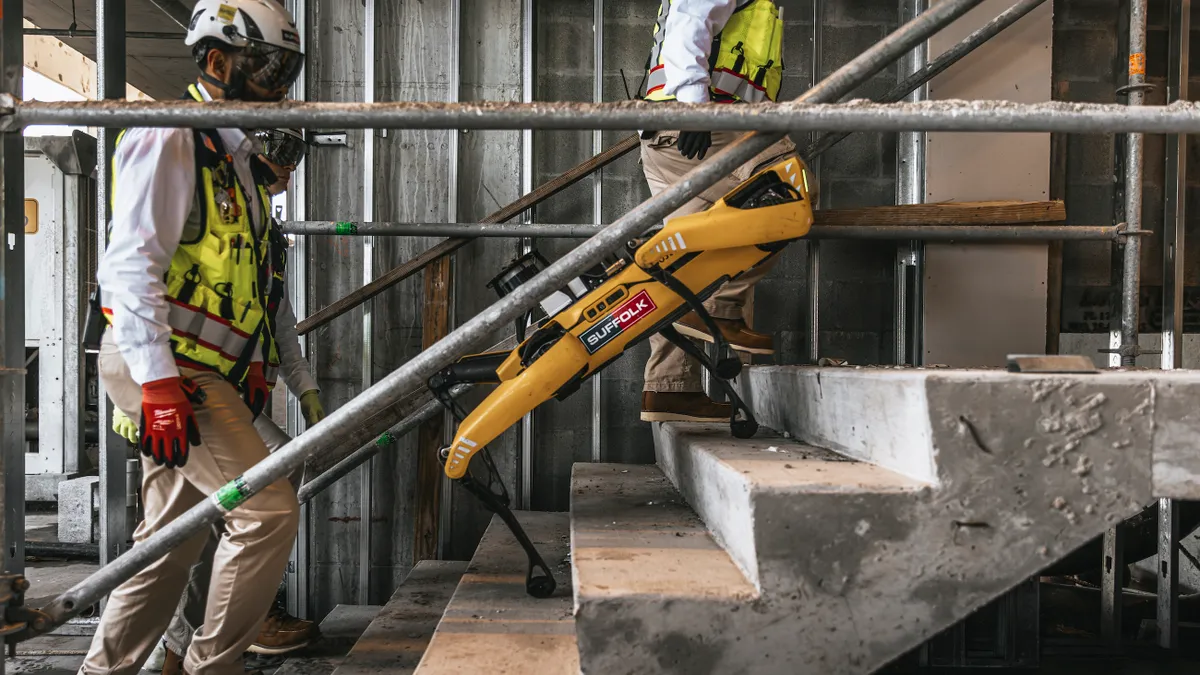This article is part of our six-part series of interviews with women leaders in construction for Women in Construction Week 2017. Read the others here.
When it comes to areas where women are breaking through the glass ceiling in construction, family-run businesses are one place where the shift has occurred earliest. One reason for that is the built-in mentorship experience that typically occurs as younger generations are trained in the industry by experienced employees and even customers.
Such was the case for Meagan McCoy Jones, who today is the fourth-generation executive vice president and chief operating officer of McCoy’s Building Supply. The Texas-based building material supplier is one of the largest regional operations in the country, with roughly 2,300 employees across more than 80 locations in Arkansas, Mississippi, New Mexico, Oklahoma and Texas.
Construction Dive spoke with McCoy Jones about why she decided to stay in the family business, how she learned the ropes and how she has been able to flip the script on double standards facing women in the field.
Editor’s note: This interview has been edited and condensed.
Meagan McCoy Jones
How did you first get started in your family's business?
MCCOY JONES: I started [at McCoy’s] as a really little girl. I would follow my dad [current President and CEO Brian McCoy] to work on teacher in-service days and during the summer. I would help answer the phones before there was voicemail. Even though I went to work with my dad, I wasn't working right next to him. I was a part of, at that time, a group of women who manned the phones. I took a few summers to do different kinds of jobs for other organizations, and also worked in the advertising, accounting and training departments, and in the store. I went away to college but worked in one of the stores part-time and realized I woke up faster on the days I went to work than on the days I went to school. I really loved being a part of the store crew. I didn't know a lot — I didn't grow up being a homebuilder or working with a lot of the materials that we sell — so i had a lot to learn, and I still do.
How did you learn the different elements of the industry?
MCCOY JONES: [During that time], I worked for a [non-family-member] manager who made it a part of his job to help me learn as much as I could in a year, which was a real gift. It has happened several times in my career at McCoy’s in really specific ways, where I've had a particular job for a particular length of time and, gratefully, my boss in that role [said], "OK, you're headed off to do bigger things [in this company], so we've got to get you as much training and mentorship as we can while you're here." That was when I learned how to drive a forklift and run a delivery schedule and what you do with PVC cement — really basic stuff. I also learned how our computer system runs and how policies really get implemented in the field. That kind of stuff is foundational to being a good decision maker. I also worked a year and a half at headquarters on a rotation of our departments. Then I went back to a store in Austin, TX, and was an assistant manager there for a year before coming back to headquarters. My dad said, 'If you're really going to understand the business and the pressure of running a lumberyard, you've got to be in management there.' I felt horribly unqualified for that, but it was probably the most wonderful part of my career.
From that period of intensive hands-on learning to your first management experience, what kind of a sense did you get as to how being a woman was perceived by your coworkers and customers, given that the industry is so male-dominated?
MCCOY JONES: The people I worked for, I think, saw value in me and wanted to help me succeed. Our industry can be pretty crude to a woman at times, and that was true for me, too. A lot of times, it meant I was underestimated, which is actually really powerful. I've told a number of women — particularly women college students or interns — that if you are underestimated, then it doesn't really actually take that much work for you to impress somebody. And wouldn't you rather be underestimated than overestimated? My counterparts who were men my age also learning the assistant manager job, they were expected by our customers to know the answers to everything. If, as women, you use that well and are still really prepared and work hard to learn as much as you can and are respectful all along the way, then you can make a really big impact. I felt like I could.
The reason why I have been able to be successful is because the men ahead of me in their career paths wanted me to be successful, and I'm very grateful for them. That starts with my dad and all the men I have worked for. They believed that I was capable of things that I didn't even believe. We need champions like that in all of our jobs — men and women. None of us make it on our own.
I’ve heard similarly from other women in the industry who have said they’ve felt the need to be over-prepared and then ended up still surprising people with that knowledge. How does that affect your own mentoring of the next generation?
MCCOY JONES: I travel to all of our stores and usually get to about 40 or 50 a year. I’m in every store every other year. What I have taken away from that is when people from headquarters visit the lumberyard, they [often] just want to talk to the manager. This is not as true now, but it was eight or 10 years ago. And when you’re the assistant manager, you’re kind of hoping someone will ask your opinion, too. So I’m working hard to ask as many of our crew members as possible, and also customers, what’s working in their job, what frustrates them, what’s hard on customers to deal with, what’s making it easier for them to want to buy from us. I know what I know and I don’t know what they know. I want to ask good questions.
For me, a growth area is being able to ask a question and really listen to understand the other person's perspective, not just ask the question to make conversation or ask the question to figure out how to convince someone of my perspective. We have a bunch of really smart people who are doing these jobs all the time, dealing with a range of customers and issues and products. I feel like I'm doing my job when, as I'm traveling, I'm attentive to their experiences and perspectives on what's working and not working. It's not their job to solve all those problems.
What are your biggest strengths?
MCCOY JONES: I am often not the smartest person in the room. My immediate team, some of them have 20 or 30 years on me in the business, and they're just really really smart. One of my strengths is trying to understand how my [leadership] style is affecting other people and the emotional dynamic to the way we work and collaborate. You can't lead a team well unless you understand what needs they have and how you can be attentive to them. So, for example, instead of wanting to have meetings to understand a problem, it had been my tendency to say, ‘Will you just do X, Y, Z and fix it’? And while it seems fine to just give an order, that makes the assumption that I know exactly what the problem is, which is often not true. I know what the A-problem is, but i don’t know know what the B-problem is. It creates a culture of, ‘OK, Meagan asked to do this, we're just going to do it.’ But if somebody's scratching their head going, ‘I wonder why she asked that because that really isn't the right problem to solve,’ it doesn't create the environment that allows that conversation to happen.
That’s a very self-aware approach to leadership. You’ve previously spoken about how being a woman in this space often means taking that kind of tack. Given that your team is predominantly male, would you do the same leading a team of all women, for example?
MCCOY JONES: All my teams have been all-men. I had a few women who worked for me when I was an assistant manager, but our entire executive team and senior team and my two direct reports, those are all-men. I don’t think they'll be all-men forever. We have more and more women who are involved in the business. I have no idea what it would be like to lead a team of all women. Occasionally, I get asked to join a 'women in business' conference and other events like that. I’m grateful when a group of women comes together, but I'm grateful because we're coming together with a sense of purpose and with some kind of work we're trying to do. When we come together just for the sake of the fact that we're women, it hasn't been my experience that that's been an all-positive thing.
What do you mean by that?
MCCOY JONES: Women are very hard on other women. I’m grateful this has changed, but in the past, I would say, women assumed there were a finite number of spaces for women at the top and if you're in one, it means you're taking my spot. There was sort of this weird, ‘Every board gets its token woman and if you're up there, I’m not up there' [perspective]. It can be hard to get more vulnerable and be willing to share with other women what's going on [in business]. When we can come together as women to encourage the complex people that we are and the complex jobs that we have, that's when we're at our best. When that's not happening, it's a shame.
What advice do you have for women seeking a career in the construction industry, across all levels and segments, as far as making their own mark?
MCCOY JONES: You have to work hard. Everybody has to work hard. That's not unique to women. Commit to being a student of the business. Really study: What makes the industry work? Why is that new product important and how does it work? Walk job sites; use the equipment that we sell; be competent at running a forklift; be able to help make a delivery. You don't have to lift 150 pounds and take drywall up to the second floor of a house. But understand why, when a new kind of drywall hits the market, it is important. It goes back to what I said earlier, [being a student of the industry] makes you stand out, and that's a valuable thing.
When we can talk to our customers about what we sell and why we sell it and how we can solve their problems, that's really powerful. If you're a woman, it's even more powerful because people don't expect you to know it quite the same way. It's kind of cool. When a woman in our business really knows what she's talking about, people will say, ‘Man, that's impressive.’ When a guy does, they're like, 'Yeah, he knows what he's talking about.' So I say, don't miss an opportunity to be impressive. And be prepared.





















